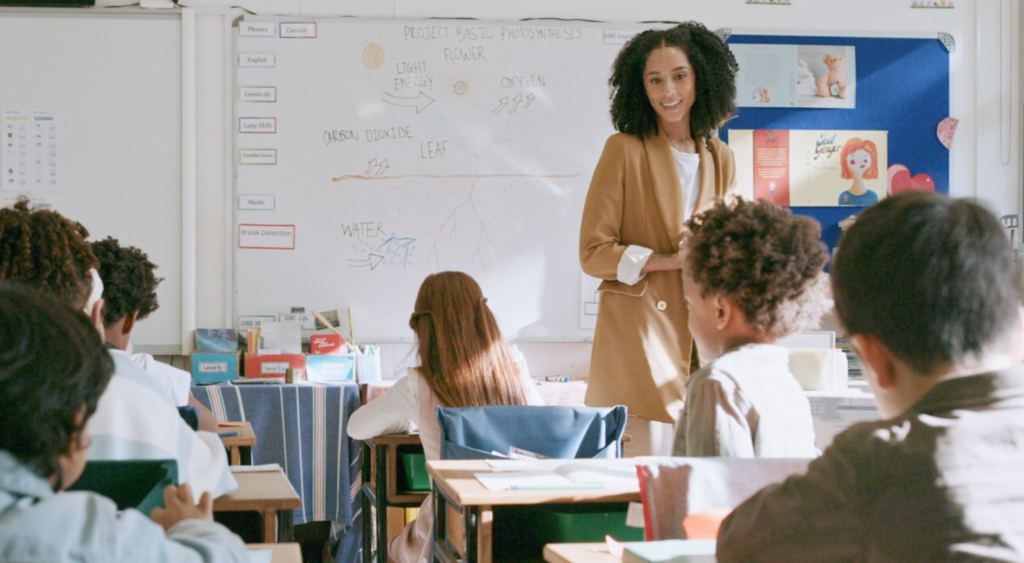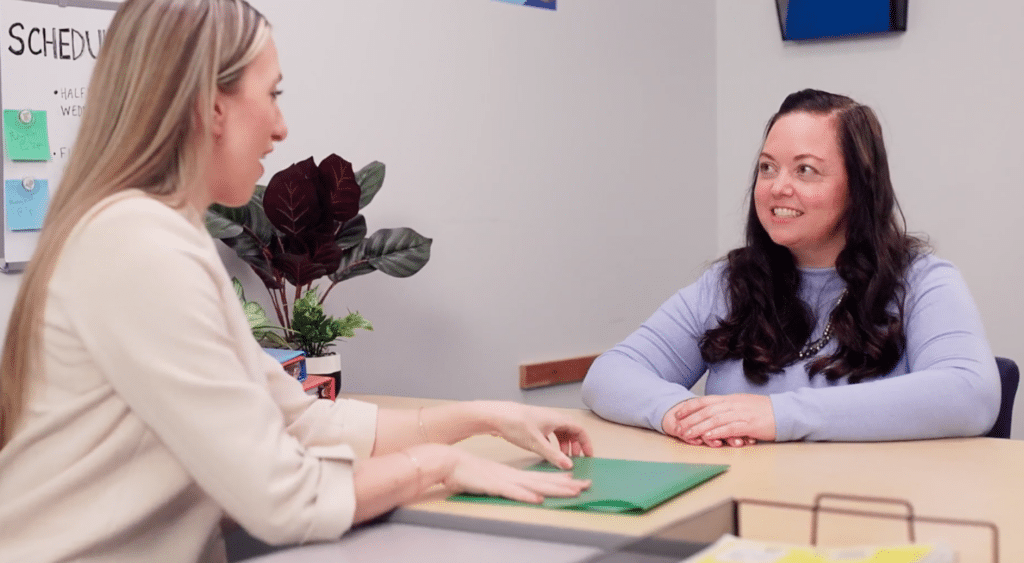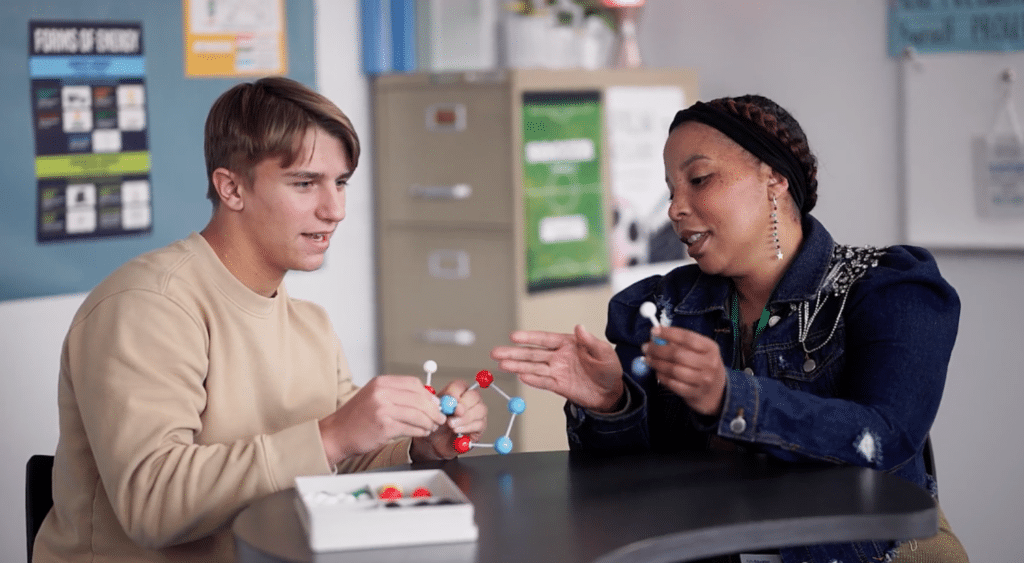School paraprofessional job description, duties, and responsibilities.

If you have a strong desire to do meaningful work with students, becoming a paraprofessional in education could be the ideal role for you! Let’s review a paraprofessional job description, duties, and responsibilities.
Kelly Education partners with schools nationwide to hire thousands of substitute and permanent paraprofessionals (also known as paraeducators) each school year. So, we’re the experts in what they do and how to become a paraprofessional or paraeducator. In this article, we’ll review a typical example paraprofessional job description that includes:
- Paraprofessional job titles
- Qualifications required to become a paraprofessional
- Reporting structure
- Paraprofessional job goals
- Paraprofessional duties and responsibilities
Alternative paraeducator job titles.
When talking about paraeducators, some schools will use job titles like paras, parapros, or paraprofessionals. At Kelly Education, we prefer “paraeducator” because it’s both respectful and accurately reflects the training it takes to do their work in education, like paralegals or paramedics working in the legal or medical fields. When searching online, you may also see these roles listed under job titles like:
- Education technician
- Teacher aide
- Instructional assistant
- Classroom assistant
- Learning support assistant
- Education assistant
- Teaching assistant
Qualifications.
The qualifications section of a paraprofessional job description outlines the minimum state and district requirements for the job. For most, it’s 18 years old and successful completion of a background check.
Other qualifications may include the ability to:
- Read, communicate, and write in fluent English.
- Assist students of varying ages and sizes as part of their instructional support program.
- Lift necessary materials and supplies.
- Maintain school staff and student confidentiality.
- Dress in a professional and safe manner and according to the dress code policy.
- Develop a positive role in school and community relations.
- Have effective communication, organizational, time management, and interpersonal skills.
- Establish effective working relationships with students and school district staff.
- Follow verbal and written instructions.
Reporting structure in the school.
This section defines who the paraprofessional reports to within the school. If you’re a substitute paraeducator, this might change from day to day or with each assignment. Typically, paraprofessionals report to the school principal or an assigned teacher.
Paraprofessional job goals.
Given the diverse learning styles and abilities of students with special needs, a key goal of a paraeducator is to collaborate closely with teachers and administrators to provide tailored support that meets each student’s unique needs.
They can assist small groups as well as individual students. Beyond academic support, paraprofessionals also assist in areas like social interaction, communication, movement, behavior, and safety. This ensures a comprehensive approach to each student’s development.
Paraprofessional duties and responsibilities.
While duties and responsibilities of the paraeducator or paraprofessional can vary between assignments, they always work closely with and under the guidance of the supervising district or school teacher and are responsible for carrying out the instructional support activities planned by the teacher.
Common duties listed in a paraprofessional job description can include:
- Supporting lead teachers with lesson plans
- Providing additional support for students with special needs
- Offering pre-teaching instruction and reinforcing classroom lessons
- Encouraging positive peer interactions and social-emotional development
- Promoting inclusivity and a sense of belonging
- Empowering students to engage in classroom activities
- Answering student questions as directed
- Following district safety protocols and policies on physical contact
- Assisting students with hygiene and restroom needs
- Immediately reporting any suspected or witnessed abuse
- Preparing curriculum materials as instructed
- Helping with classroom management
It’s important to note that certain duties and responsibilities, such as assisting with hygiene activities, should only occur under the direct supervision or direction of the district teacher or personnel.
If you’re ever unsure about what is or is not permissible, always ask the district teacher, school personnel, or the staffing firm that placed you. Seeking clarification shows your professionalism and dedication to your role.
Job descriptions can also include unacceptable duties and responsibilities. For example, they shouldn’t:
- Prepare lesson plans
- Have sole supervisory responsibility for the entire school day
- Assign student grades
- Introduce new skills or lessons
- Replace a teacher for direct instruction
- Administer medication
- Provide sole supervision for students during bus pickup or drop-off
How much does a paraprofessional get paid?
School districts typically pay their staff paraeducators along with the rest of their faculty and staff weekly or bi-weekly. It may be an hourly rate or a paraprofessional salary.
If you work for Kelly Education as a permanent or substitute paraeducator, we pay our substitute paraeducators a daily or hourly wage rate. Our paychecks come weekly. The pay scale is set by the district according to local labor market standards.
Become a paraeducator with Kelly Education.
At Kelly Education, we offer training, ongoing support, and professional development for this vital role because we know what it takes to support students with special needs. We also know that all educators value continuous learning and growing their skills.
Ready to take the next step? Read our article: How to become a paraprofessional.
Or simply fill out our brief interest form and one of our recruiters will contact you to answer your questions. They’ll also share more about opportunities to work with our school district partners.

View Related: Article Job searching
You might like
Do substitute teachers get health benefits?
3 minute read
Do substitute teachers get health benefits?
3 minute read
Find your next job
Discover thousands of temporary, full-time, and remote jobs for beginning and experienced job seekers.


